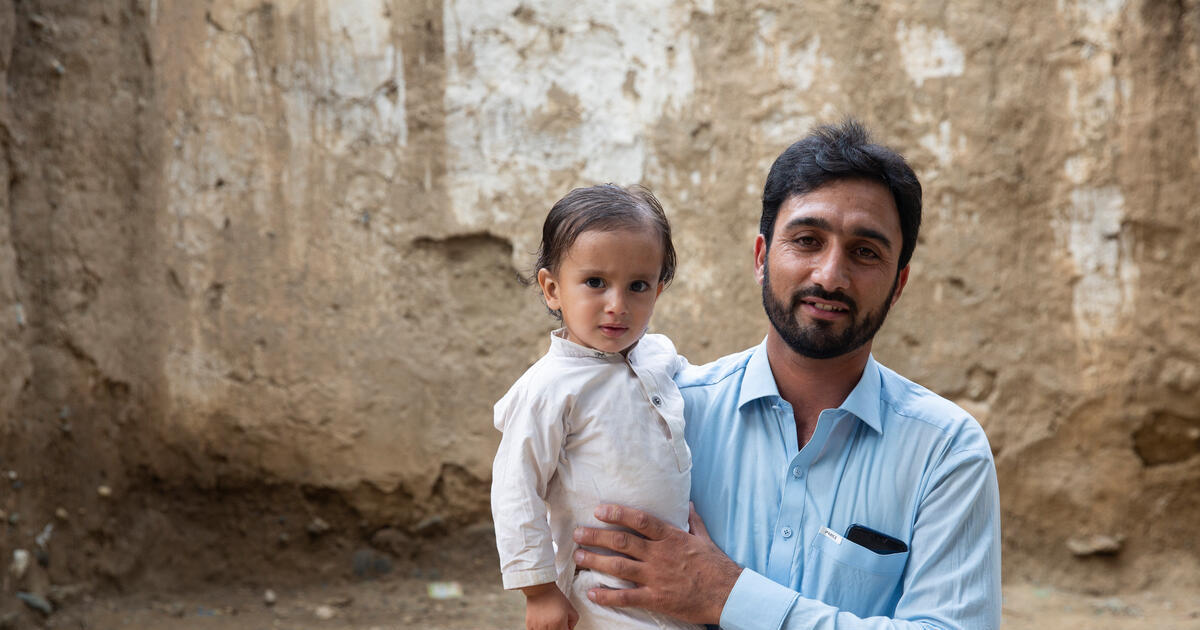Jamil-ur-Rehman, a second-generation Afghan refugee, was born in Pakistan.
As a disabled person and a refugee, he has faced numerous obstacles in his quest to gain an education.
Deep-rooted community attitudes about disability actively prevented him from attending school in his village in northwest Pakistan.
His neighbours in the Lower Dir district of Pakistan’s rugged Khyber Pakhtunkhwa province where he lived would say he could never be a teacher or a soldier.
“Nobody thought I could do anything,” he says. “My parents were interested. [in sending me to school]but some elders in my community put obstacles in my way, saying that because I have a disability, I cannot receive an education.’ Jamil knew this was not the case.
“I want to bring smiles to other people’s faces.”
Now 33, he has dedicated his life to removing the barriers that prevent disabled refugees from attending school in Pakistan and changing attitudes about what they can achieve in school.
“Because I am disabled, I understand the feelings and pain of disabled people,” he says. “I wanted to forget my disability and do something for other people. I want to bring a smile to other people’s faces.”
Jamil founded the Afghan Refugee Disabled Union (ARDU) four years ago in Khyber Pakhtunkhwa province, home to many of the refugees who have left Afghanistan since the first wave of displacement when conflict erupted in 1979.
With support from the Afghan refugee community, the local union has so far distributed 60 wheelchairs to young people in refugee villages who need them to attend school and realise their potential.
“I don’t want people with disabilities to feel like they can’t be happy or independent,” Jamil says of her work. “They can do anything they want.”
An estimated 12 million people with disabilities around the world are forcibly displaced due to persecution, violence and human rights violations, but studies and assessments suggest the actual number is likely much higher.
They are at higher risk of violence, discrimination, exploitation and abuse, often face barriers to accessing basic services, and are frequently excluded from education, work and livelihood opportunities.
“I gradually realised that education is important to make my voice heard,” Jamil says. “Without education, you can’t achieve anything in life. No one will listen to you.”
He finally had the opportunity to learn to read and write at age 12, with support from Basic Education for Afghan Refugees, a local partner of the United Nations High Commissioner for Refugees (UNHCR), in providing literacy and numeracy at home.
He persisted and eventually enrolled in a local refugee village school, completing the third grade at the age of 18. But like many children and young people in the village, this was the extent of his formal learning opportunities.
“I did everything I could… but I couldn’t do anything else and I didn’t have the chance to do anything more.”
As he continues to educate himself (maths is his passion), he is working hard to get more refugees with disabilities into the classroom and to challenge the low expectations of what they can achieve when they do enter.
Among them is Gul Bibi*, a 16-year-old refugee young person with a disability who used to be driven to primary school by her parents every day, but was on the verge of dropping out multiple times until Jamil worked with her family to buy her a wheelchair.
“When I found out that my brother Jamil was supporting me to go back to school and even bought me a wheelchair so I could get around with ease, I started dreaming big,” she says.
Gul has since completed her primary education and is now able to move around freely on her own. She feels more confident and optimistic about her future and wants to become someone who, like Jamil, helps other people with disabilities gain access to education.
“Many children with disabilities have been rejected, ridiculed, viewed with suspicion and fear, and those who are in school are not adequately supported to make their education meaningful,” she said.
“My disability is a strength.”
Another wheelchair user Jamil helped recently was disabled seven-year-old Awais, whose weight had become too heavy for his father, Zakhar Ullah, a daily wage labourer, to carry and he struggled to get to school, shops and hospitals without help.
“Jamil is always worried about Awais and still comes to visit him with sweets and his favorite cookies,” says Zakhar Ullah. “Awais can now move around, go to the playground and enjoy nature with very little support from me.”
UNHCR supports Jamil’s pioneering work and is also working with the government to expand education opportunities for 1.4 million Afghan refugees in Pakistan, including people with disabilities.
Meanwhile, Jamil continues to advocate for more support for Afghan refugee children in his village, and wants his community to realise the value of education for everyone.
“Education has been important in shaping who I am. My education is a strength, my disability is a strength,” he says. “I want my community to be positive. I want to empower other members of the disability community. We are part of this world.”
*Names have been changed at the refugees’ request.

